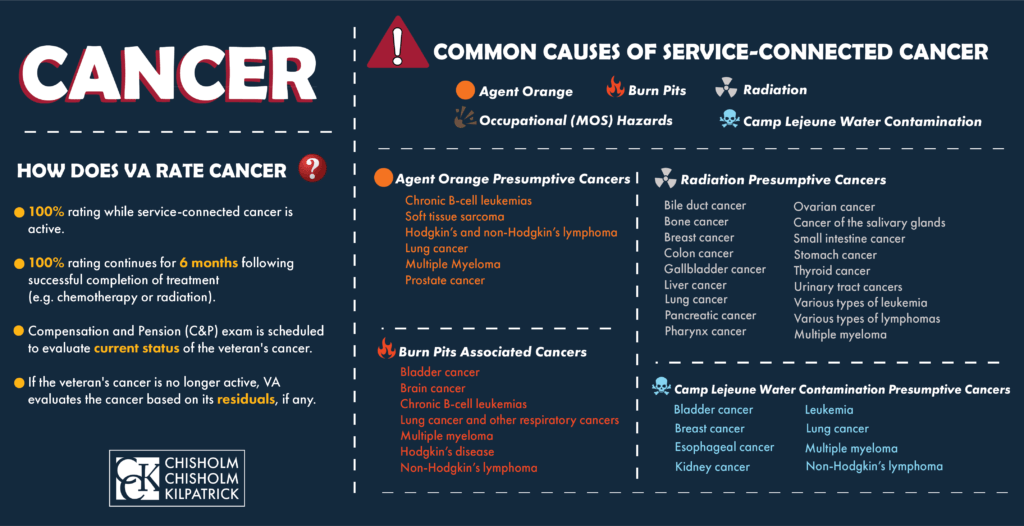VA Disability Benefits for Colon Cancer and Agent Orange

CCK Law: Our Vital Role in Veterans Law
Agent Orange is a powerful herbicide used extensively by the US military during the Vietnam War era that went on to cause a slew of health conditions for exposed veterans. As such, many veterans who were exposed to Agent Orange developed colon cancer as a result. If you are a veteran who developed colon cancer after Agent Orange exposure, continue reading to learn more about benefits that may be available to you.
What is Agent Orange?
Agent Orange was a chemical herbicide used to defoliate large areas of land in Thailand, Vietnam, and Korea. It was also tested, used, and stored at various other locations. Unfortunately, research later showed the herbicide was highly toxic to anyone who came in proximity with it.
Agent Orange is composed of a mixture of two kinds of herbicide agents, 2, 4-D and 2, 4, 5-T. The highly toxic dioxin contaminant known as 2, 3, 7, 8-TCDD is a byproduct produced by Agent Orange. This toxic dioxin contaminant has caused many serious health conditions for Vietnam War Veterans.
The effects of Agent Orange can take years to appear. As such, many veterans did not develop conditions related to Agent Orange until long after their exposure.

What is Colon Cancer?
Colon cancer, sometimes referred to as colorectal cancer, is a type of cancer that occurs in the colon (i.e., the large intestine or large bowel) when the cells in either the colon or the rectum grow out of control.
Abnormal growths, or polyps, can turn into cancer, so it is important to be screened in order to determine if the polyps are cancerous.
Symptoms of colon cancer can include:
- Change in bowel movements
- Blood in or on bowel movements
- Diarrhea
- Constipation
- Feeling of bowels not emptying all the way
Connection between Agent Orange Exposure and Cancer
VA acknowledges that several cancers have been linked to Agent Orange exposure in veterans.
Presumptive Service Connection and Agent Orange Exposure
There are some conditions that VA recognizes as being linked to Agent Orange exposure, and as such, VA grants presumptive service connection if the veteran can prove exposure. The following conditions have presumptive service connection when linked with Agent Orange exposure:
- AL Amyloidosis
- Bladder Cancer
- Chronic B-cell Leukemias
- Chloracne
- Diabetes Mellitus Type 2
- Hodgkin’s disease
- Hypertension
- Hypothyroidism
- Ischemic Heart Disease (including but not limited to, coronary artery disease and atherosclerotic cardiovascular disease)
- Monoclonal Gammopathy of Undetermined Significance
- Multiple Myeloma
- Non-Hodgkin’s Lymphoma
- Parkinson’s Disease
- Parkinson’s-like Symptoms
- Peripheral Neuropathy
- Porphyria Cutanea Tarda
- Prostate Cancer
- Respiratory Cancer
- Soft Tissue Sarcomas (not including osteosarcoma, chondrosarcoma, Kaposi’s sarcoma or mesothelioma)

Is Colon Cancer a Presumptive Condition for Agent Orange Exposure?
While colon cancer related to Agent Orange exposure is not currently eligible for presumptive service connection, veterans can still become service-connected for colon cancer related to Agent Orange exposure. The process, however, may be more difficult.
How to Establish Service Connection for Colon Cancer
Since colon cancer is not presumptive, veterans need to submit the documentation necessary to establish service connection. This means that veterans need to submit the following, in addition to a filled out VA Form 21-526EZ:
- A current diagnosis of colon cancer;
- Evidence of an in-service event, illness, or injury; AND
- A nexus linking the veteran’s in-service occurrence with their colon cancer
In the case of Agent Orange exposure, the veteran’s in-service event would be their exposure and the evidence could be service records or other documents proving the veteran served in locations where Agent Orange was used. For a nexus, the veteran will need to submit medical evidence linking colon cancer to Agent Orange exposure.
In addition, veterans can also submit supporting evidence to prove their exposure. For example, a lay statement, or buddy statement, from a fellow service member who was also exposed may help support the veteran’s claim.
How Does VA Rate Colon Cancer?
If a veteran is service connected for an active cancer, VA should automatically assign a 100 percent disability rating. A veteran will maintain this 100 percent rating for as long as their cancer is active. This rating will also continue for six months after the successful completion of a treatment program, such as chemotherapy, radiation, or surgery. The 2025 monthly compensation rate for a 100 percent rating is $3,831.30, while the 2026 compensation rate is $3,938.58.
After six months have passed, VA will schedule a Compensation & Pension exam to evaluate the current status of the veteran’s cancer. If the cancer is no longer active, VA will then assign as rating based on the residuals.

Getting an Accredited Representative to Help with VA Disability Benefits for Colon Cancer Related to Agent Orange Exposure
Veterans may need assistance winning VA disability benefits for their colon cancer due to the complicated nature of colon cancer claims. Specifically, veterans may have difficulty proving exposure to Agent Orange or establishing service connection since colon cancer is not presumptive. If you have previously been denied benefits for colon cancer related Agent Orange exposure, the skilled veteran’s advocates at Chisholm Chisholm & Kilpatrick may be able to help. Call today for a free case evaluation.
About the Author
Share this Post
